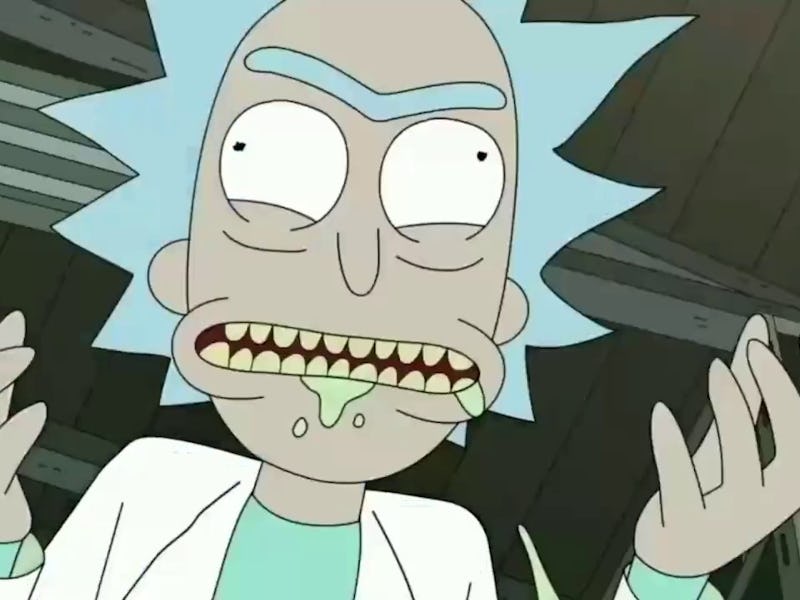Rick's Szechuan Rant Proves He's a Camus-esque Existentialist
"They’ve kind of set up a 'will he or won’t he' with Rick caring about his family."

Everyone loves Rick and Morty, but no one is entirely sure whether to take it seriously. Sometimes Justin Roiland and Dan Harmon’s animated comedy lampoons classic sitcom tropes, and in other scenes, it appears to genuinely want Rick and the Smith family to act like real people. Rick and Morty is more earnest than Family Guy but more chaotic in tone than The Simpsons, and its changing values has attracted the interest of obsessive online fans and philosophers alike.
Enter the guys at Wisecrack, who uploaded a new installment in their Philosophy of ‘Rick and Morty’ series this week, exploring whether Season 3 Episode 1’s extended Szechuan sauce confirms Rick’s true nature.
Sentimental Rick and Morty fans look for emotional breadcrumbs from Rick Sanchez, jumping at any mention of him caring about Morty, Summer, and Beth. The Season 3 premiere teased these viewers mercilessly, giving us a look at Rick’s wife only to snatch it away. When Rick saved Morty and Summer, the show refused to linger on that moment for too long, making Rick erupt into a nihilisti, slobbering diatribe that ended the episode. So what does this mean about who Rick really is?
Alec Opperman, one of the Wisecrack creators, tells Inverse via email that the push and pull in Rick’s psyche is what makes the show feel so alive. “They’ve kind of set up a “will he or won’t he” with Rick caring about his family. That’s interesting, but might get old after a few more seasons. I think what made the transition between the last and current season great is that they went from riding that line, to really doubling down on Rick’s sociopathy.”
Of course, it’s not enough for Rick to simply be a sociopath; almost every protagonist on Adult Swim cartoons could arguably be called one. As Opperman says, “I imagine that at some point, there’s going to be some strong pressure to develop Rick’s character by softening him. I don’t think the show can keep baiting us with meaning only to double back to meaninglessness. But I really hope the show finds a way to surprise us, and go in a weird, dark direction.” What makes Rick so interesting is that Harmon and Roiland write him as intelligent enough to choose not to care about his environment.
Opperman and the other writers at Wisecrack believe Rick’s choices make him an existentialist like Albert Camus, whom Rick and Morty’s stoner bro-fan horde may know from the ubiquitous college dorm poster quote, “In the depth of winter, I finally learned that within me there lay an invincible summer.” Opperman says, “I think Rick would agree generally with existentialists, and Camus, that the universe is a cruel, meaningless place that’s indifferent to our existence. But would Rick agree with Camus that we should enjoy the absurdity of it all? I’m not sure.” We see Rick enjoying some meaningless stimuli — Blips and Chitz, interdimensional television, the Purge planet, traveling around the galaxy aimlessly with Morty — but we also see him mourn life’s lack of meaning, especially when our universe deals him a shitty hand.
“Rick is ‘in great pain,’ according to his catchphrase,” Opperman points out, referencing the Birdlanguage translation of “wubba lubba dub dub,” “and [he] seems to hate everything. On the other hand, his absurd quest for Szechuan sauce really speaks to Camus’s point.” If Rick really does have an objective across the show’s three seasons, even if that objective is to obtain a discontinued dipping sauce from McDonald’s, that means his response to understanding the meaninglessness of our world is a fun one, one that brings him joy. That would make him a Camus-style existentialist.
The rest of Season 3 will either lean harder on this reading of its protagonist or else Rick and Morty will continue to tease us and toe the line. Watch Wisecrack’s full philosophical analysis of Rick and Morty’s Season 3 premiere below.
Rick and Morty returns to Adult Swim in July.